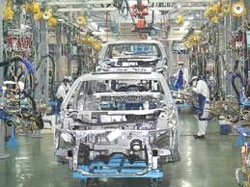HVN slow to drive price change
 The Vietnam Standard and Consumers Association (VSCA) recently criticised that Honda Vietnam (HVN) had done nothing to protect Vietnamese consumers. The criticism came as prices of HVN’s automatic gear motorbikes had rocketed over the past three months.
The Vietnam Standard and Consumers Association (VSCA) recently criticised that Honda Vietnam (HVN) had done nothing to protect Vietnamese consumers. The criticism came as prices of HVN’s automatic gear motorbikes had rocketed over the past three months.
“We feel dissatisfied with HVN’s responses to us. While HVN says its local distributors are its authorised ones, it lets them freely augment motorbike prices without taking any action to curb such rocketing prices, which are harming consumers,” said an association representative, who declined to be named.
HVN’s proposed average price is around VND50 million ($2,564) for a newly launched PCX motorbike in Vietnamese market and VDN31 million ($1,589) for Honda Lead motorbike. However, the market price is VND65-70 million ($3,333-$3,589) for a PCX motorbike and VND38.5 million ($1,974) for a Honda Lead. Honda’s motorbikes currently occupy 50 per cent of Vietnam’s motorbike market.
“HVN said it raised its productivity and output to meet the increasing demand, but domestic consumers still cannot benefit from this move,” the VSCA representative told VIR.
HVN said in a letter sent to the association that HVN always asked its distributors to sell the products at “suitable prices”.
“But HVN has no legal right to force its distributors to sell the products at the prices proposed by HVN. If HVN does that, it would violate Vietnam’s Competition Law and the international common practice,” the letter read.
“Relations between HVN and its distributors is that of independent businesses, which are equal before the law.”
“After HVN sells its products to any distributor, such products will become that distributor’s assets, not HVN’s. Thus, HVN has no right to determine the prices,” said HVN sales manager Tetsuya Kawahara.
But, the VSCA representative said: “How can HVN act that way? It must show its responsibilities to customers. Honda product sellers cannot twist consumers around their little fingers.”
He also said Honda motorbike sellers were “violating” Clause 13’s Article 2 and 5 of the Competition Law, under which an enterprise, with its monopoly of goods in the market is banned from imposing irrational prices of services and goods on its customers.
An enterprise is considered having monopoly if it either has a market share of 30 per cent upward or is able to limit other enterprises’ competitiveness remarkably. In this case, Honda’s motorbikes currently occupy 50 per cent of Vietnam’s motorbike market.
“Personally, I think that the government has no strict punishments for such sellers,” the VSCA representative admitted.
According to HVN, it is trying to expand its production output in Vietnam, from 1.5 million motorbikes now to two million per year after July, 2011.
“HVN’s increased production is expected to help reduce product prices,” Kawahara said.
What the stars mean:
★ Poor ★ ★ Promising ★★★ Good ★★★★ Very good ★★★★★ Exceptional
Related Contents
Latest News
More News
- State corporations poised to drive 2026 growth (February 03, 2026 | 13:58)
- Why high-tech talent will define Vietnam’s growth (February 02, 2026 | 10:47)
- FMCG resilience amid varying storms (February 02, 2026 | 10:00)
- Customs reforms strengthen business confidence, support trade growth (February 01, 2026 | 08:20)
- Vietnam and US to launch sixth trade negotiation round (January 30, 2026 | 15:19)
- Digital publishing emerges as key growth driver in Vietnam (January 30, 2026 | 10:59)
- EVN signs key contract for Tri An hydropower expansion (January 30, 2026 | 10:57)
- Vietnam to lead trade growth in ASEAN (January 29, 2026 | 15:08)
- Carlsberg Vietnam delivers Lunar New Year support in central region (January 28, 2026 | 17:19)
- TikTok penalised $35,000 in Vietnam for consumer protection violations (January 28, 2026 | 17:15)

 Tag:
Tag:




















 Mobile Version
Mobile Version